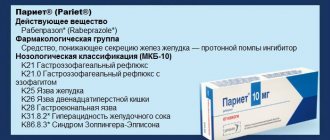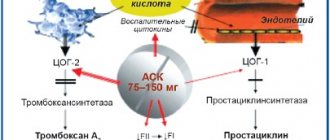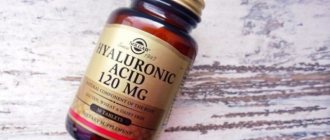Acetyl acid - how to take the drug
Take the drug orally after meals with a sufficient amount of liquid.
The drug should not be used for longer than 3-5 days without consulting a doctor.
Adults and children over 15 years old.
500-1000 mg as a single dose. Repeated use is possible after 4-8 hours. The maximum daily dose should not exceed 4 g.
Notifications.
For patients with concomitant impairment of liver or kidney function, it is necessary to reduce the dose of the drug or increase the interval between applications.
Children.
The drug should be used in children over 15 years of age. Do not use drugs containing acetylsalicylic acid in children with acute respiratory viral infection (ARVI), which is accompanied or not accompanied by an increase in body temperature. Some viral illnesses, especially influenza A, influenza B and chickenpox, are at risk of developing Reye's syndrome, which is a very rare but life-threatening illness that requires urgent medical attention. The risk may be increased if acetylsalicylic acid is used as a concomitant drug, but a cause-and-effect relationship has not been proven in this case. If these conditions are accompanied by prolonged vomiting, this may be a sign of Reye's syndrome.
Instructions for use of acetyl acid
Acetylsalicylic acid is classified as a non-steroidal anti-inflammatory drug with an analgesic effect. When starting to take it, you should not only know the main indications, but also be aware of the possible additional properties of this unusual substance.
When is the drug used?
As a rule, acetyl acid is used to relieve pain of various etiologies, as well as to treat a number of inflammatory diseases. Indications for its use include the following:
- high body temperature, which accompanies, in particular, respiratory tract infections;
- headache;
- toothaches;
- severe pain during menstruation;
- pain due to osteoarthritis;
- neuralgia;
- pain in muscles and joints;
- pain due to osteochondrosis;
- rheumatic fever;
- rheumatoid arthritis.
The drug is recommended to be taken after meals to reduce the degree of irritation of the mucous membranes of the digestive tract. It can be washed down with water or milk.
Contraindications
The use of this active substance should be avoided in case of the following ailments and conditions:
- age up to 15 years;
- stomach and intestinal ulcers;
- bleeding disorders;
- tendency to bleed;
- bearing a child and breastfeeding;
- acute and chronic pathologies of the kidneys and liver;
- hypersensitivity to the components of the drug.
Acetyl acid for colds and fever
Using medication to reduce fever for colds is the first thing that comes to mind for most people. Indeed, it copes with this task perfectly. In addition, the remedy helps eliminate chest pain due to lesions of the respiratory tract. However, to combat hyperthermia, it is more often recommended to use Paracetamol: the drug is safer and can be safely given to children
To reduce high body temperature, drink acetyl acid 3-4 times a day, 1-2 tablets. It is important to ensure that the daily dose of the substance does not exceed 4 g.
Treatment of rheumatism and joint pain
Acetyl acid has proven itself to be an effective remedy for various types of arthritis, rheumatoid and joint pain. For the treatment of such diseases, tablets are taken 2-3 g per day, divided into 3 times. A peculiarity of the treatment of joint diseases with their help is the duration of administration, which the doctor determines individually.
Antithrombotic properties
The use of the drug for the treatment and prevention of heart and vascular diseases became possible thanks to the discovery of its antiplatelet properties. It has such a fast and powerful antithrombotic effect that it is used for emergency treatment of heart attack, angina pectoris, ischemic stroke, and vascular thrombosis. Timely administration helps to avoid fatal consequences in a number of dangerous situations. However, it is worth remembering the negative aspects of the drug: it greatly irritates the intestinal mucosa. In this regard, the use of the drug for prevention should be discussed with a doctor, he should select a gentle dosage.
Skin care
The use of acetyl acid for acne in home cosmetology may seem surprising. However, our grandmothers knew this method of improving facial skin.
To combat acne and small pimples, the substance is used in the form of a solution. To create a product according to the simplest recipe, just dilute the tablets of the drug in boiled water, after which you can begin applying it to the skin. The mask is kept on the face for 10-15 minutes, after which it is washed off.
A more complex and fast-acting recipe involves adding honey and lemon juice to the resulting solution. A teaspoon of the product is applied to problem areas of the skin for 10-15 minutes. This mask is quite aggressive, but it helps to get rid of acne very quickly.
Acetyl acid from pomelia
The benefits of acetylsalicylic acid for hangover syndrome are widely known among people. It is drunk after meals, washed down with water or milk. You can take no more than two tablets at a time. The product can be taken throughout the day, adhering to the maximum daily dosage.
It is important to remember that the combination of alcohol with acetyl acid can cause internal bleeding, so it is permissible to take the medicine no earlier than 6 hours after a violent feast.
By understanding what acetyl acid helps best and in what situations it is best to avoid it, you can use it effectively in many cases. The usual medicine has a fairly wide range of capabilities and can provide no less effective help than its more expensive “colleagues”.
Acetyl acid - contraindications, side effects
Contraindications.
Hypersensitivity to acetylsalicylic acid, other salicylates or any component of the drug.
Bronchial asthma caused by a history of use of salicylates or other NSAIDs.
Acute gastrointestinal ulcers.
Hemorrhagic diathesis.
Severe renal failure.
Severe liver failure.
Severe heart failure.
Combination with methotrexate at a dosage of 15 mg/week or more (see section "Interaction with
other drugs and other types of interactions").
III trimester of pregnancy.
Adverse reactions.
Gastrointestinal disorders. Dyspepsia, epigastric pain and abdominal pain; V
in some cases - inflammation of the gastrointestinal tract, erosive and ulcerative lesions of the gastrointestinal tract, which can in rare cases cause gastrointestinal bleeding and perforation with corresponding laboratory and clinical manifestations. Rarely - transient liver failure with increased levels of liver transaminases.
Blood system. Due to its antiplatelet effect on platelets, acetylsalicylic acid may increase the risk of bleeding. Bleedings such as intraoperative hemorrhages, hematomas, bleeding from the genitourinary system, nosebleeds, and bleeding from the gums were observed; rarely or very rarely - serious bleeding, such as gastrointestinal bleeding and cerebral hemorrhage (especially in patients with uncontrolled hypertension and/or concomitant use of antihemostatic agents), which in isolated cases could potentially be life-threatening.
Bleeding can lead to acute and chronic posthemorrhagic anemia/iron deficiency anemia (due to the so-called hidden microbleeding) with corresponding laboratory manifestations and clinical symptoms such as asthenia, pale skin, hypoperfusion.
In patients with severe glucose-6-phosphate dehydrogenase deficiency, hemolysis and the development of hemolytic anemia have been reported.
Allergic reactions. Patients with individual hypersensitivity to salicylates may develop allergic reactions, including symptoms such as rash, urticaria, swelling, itching, rhinitis, nasal congestion.
In patients with bronchial asthma, the incidence of bronchospasm may increase; mild to moderate allergic reactions that potentially affect the skin, respiratory system, gastrointestinal tract and cardiovascular system. Severe reactions, including anaphylactic shock and non-cardiogenic pulmonary edema, have been observed very rarely.
Nervous system: Dizziness and ringing in the ears have been observed, which may indicate an overdose.
Genitourinary system: Kidney damage and acute renal failure have been reported.
Side effects of Acetylsalicylic acid
When using Acetylsalicylic acid, patients may experience such adverse reactions from the body as:
- Nausea;
- Stomach ache;
- Anorexia;
- Diarrhea;
- Bleeding of the gastrointestinal tract;
- Erosive and ulcerative lesions;
- Headaches, dizziness;
- Noise in ears;
- Violations of the functions of the visual organs;
- Anemia, thrombocytopenia;
- Impaired liver and kidney functions;
- Hemorrhagic syndrome;
- Skin rash;
- Bronchospasm;
- Quincke's edema;
- Increased signs of chronic heart failure;
- Reye's syndrome;
- Aspirin triad.
Tomatoes marinated with aspirin and vinegar
Ingredients (per 3-liter jar):
- tomatoes – 1.5-2 kg;
- water – 1.5 l;
- aspirin – 2 tablets of 500 mg;
- garlic – 3 cloves;
- salt – 30 g;
- sugar – 40 g;
- table vinegar (9 percent) – 50 ml.
Cooking method:
- Wash the jars using baking soda and a clean sponge. Sterilize them in any convenient way.
- Peel the garlic cloves, cut into slices, and place on the bottom of the jars.
- Wash the tomatoes and dry with a paper towel. Prick the fruits with a fork or toothpick and place in prepared jars.
- Boil water and pour into jars. Cover them with clean lids and leave for a quarter of an hour. Drain the water through the special lid into the sink. Repeat the manipulation.
- Boil 1.5 liters of clean water, dissolve salt and sugar in it. Allow the brine to cool to room temperature.
- Crush the aspirin, pour it into the brine, pour vinegar into it. Mix well.
- Pour cold marinade over the tomatoes.
- Seal the jars hermetically.
Despite the fact that the marinade with which the tomatoes were poured was already cooled, the preparation made with it will stand well even at room temperature.
Indications for use
- This medicine is effective for pain syndromes, as well as for various febrile conditions. Aspirin is often used for headaches.
- Aspirin reduces body temperature in infectious-inflammatory and infectious diseases; aspirin is also used to thin the blood .
- It is prescribed as a prophylactic against strokes, embolisms, thrombosis and other diseases.
- Aspirin helps eliminate cerebrovascular accidents and is taken for coronary heart disease.
- Aspirin, like any other medicine, can cause side effects such as stomach pain, allergic skin reactions, etc. Therefore, if you notice such symptoms, you should immediately consult a doctor. It is equally important to remember that aspirin during pregnancy, in particular in the first and third trimester, can only be prescribed by a medical specialist.
We recommend reading:
Medicinal properties
A folk remedy based on aspirin and vodka is successfully used to eliminate problems with the skin of the feet.
Its popularity is due to the fact that the solution has a wide spectrum of action:
- Disinfects. The active components of the product negatively affect pathogenic microorganisms localized in problem areas of the skin, eliminating them.
- Relieves inflammation.
- Improves skin tone. The solution added to the baths helps relieve fatigue and neutralize the feeling of discomfort in the legs caused by the appearance of corns and calluses.
- Anesthetizes, stimulates metabolic processes, normalizes the condition of blood vessels, eliminates aching, sharp pain caused by a heel spur.
- Stimulates blood circulation, used for cracked heels and microtraumas, accelerating their healing.
- Moisturizes and softens dead tissue.
Disinfects and prevents secondary infections from occurring on damaged areas of the skin.
- Eliminates fungus. Often, rough skin on the heels signals a fungal infection. Acetylsalicylic acid in combination with vodka has fungicidal properties. When using the solution, a positive result in the fight against fungus is observed in the shortest possible time;
- eliminates unpleasant odor. The product for heels disinfects the skin, destroys pathogenic microflora and thereby neutralizes the unpleasant odor and prevents its reappearance.
The effect of the solution can be enhanced by adding additional components to the composition. For example, a more pronounced effect is observed if herbal tincture, lemon or celandine juice, iodine and vitamins are introduced.
The choice of one or another means directly depends on the goal being pursued.
Only with the right mixture will it be possible to achieve the desired result in the shortest possible time. Heel treatment will be quick and effective.












